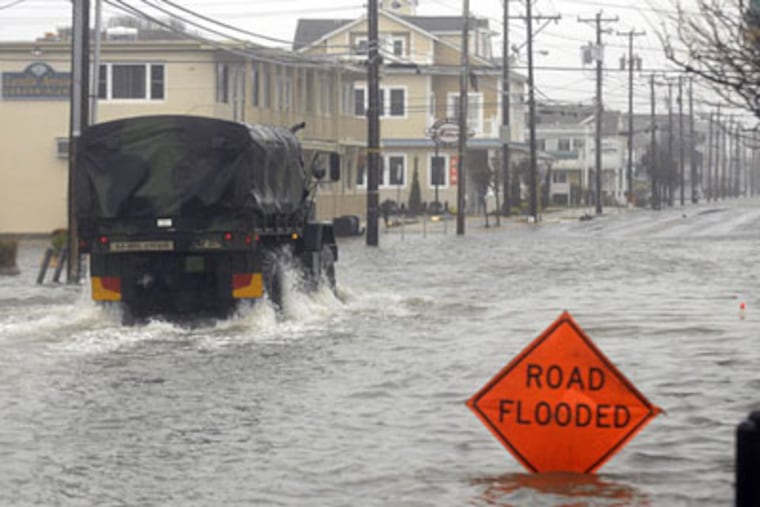Beach repairs at risk in restrictive Shore towns
Jersey Shore towns where beachfront-property owners deny public access to bathers may have difficulty obtaining federal funds to repair damage caused by a severe nor'easter this month.

Jersey Shore towns where beachfront-property owners deny public access to bathers may have difficulty obtaining federal funds to repair damage caused by a severe nor'easter this month.
In a teleconference organized by Rep. John Adler (D., N.J.) yesterday, the mayors of Ocean County towns affected by the storm heard from state and federal officials who indicated that the federal government may be a long way from writing a check to cover coastal damage.
The Nov. 12-14 storm, fueled by the remnants of Tropical Storm Ida, brought rain, heavy winds, high tides, and flooding that chewed up dunes and beaches.
With damage assessments completed over the weekend, the state Office of Emergency Management now must determine whether the tally meets the threshold for a federal disaster declaration, according to Michael Moriarty, regional administrator for the Federal Emergency Management Agency.
A presidential declaration, approved by Congress, could free FEMA money to help pay for dune and beach repairs, Moriarty told local officials. The process could take weeks.
"I didn't hear anyone saying they were writing a check any time soon, and that scares me," Frank Mancini, mayor of Long Beach Township, said after the call. "We still have a good six months of the storm season left, and we need to get those beaches secure."
Mancini and other municipal officials have used local appropriations to apply Band-Aids to some hard-hit areas. Since last week, Long Beach Township has brought in 500 dump-truck loads of sand at a cost of $200,000 to reinforce the coastline in the Brant Beach, Beach Haven Crest, and North Beach areas, he said.
Beach Haven Borough has approved $150,000 in emergency funds to begin beach repairs. The towns do not have time for the federal government to make up its mind about whether the damage meets the disaster criteria, Mancini said.
"Whoever heard of a federal disaster declaration being made so late after the fact? What's it going to be, a Christmas present?" he said. "We need to get started now, not sometime in 2010."
Private-property owners with damage have been urged to file claims with their insurance carriers, said Nick Morici of the state Office of Emergency Management.
Even if FEMA money becomes available, Morici said, there is no guarantee of aid if the damage is covered under private homeowners insurance.
Long Beach Township - which weaves non-contiguously along Long Beach Island's 18-mile length and includes Loveladies, North Beach, and Harvey Cedars - may be ground zero in a tug-of-war for FEMA funds if they become available.
Unlike much of the Shore - especially Atlantic and Cape May Counties, where the economy depends on pleasing tourists - parts of Long Beach Island retain an elitist image.
Day-trippers find it hard even to set foot on the beach. There is no place to park, few paths over the dunes, and no restrooms or other amenities for miles in some areas, creating a virtually private beach for the owners of high-priced real estate in towns on the island's upper midsection and north end.
The state Department of Environmental Protection drew a line in the sand three years ago when $71 million was allocated for Long Beach Island's first major beach replenishment.
To benefit from the project, municipalities would have to comply with state and federal regulations giving the public easy access to the waterfront. That meant creating more paths and additional parking and restrooms.
With properties cheek-to-jowl in many areas, that required homeowners to grant easements so that the features could be built and heavy equipment could access the beach to perform the replenishment.
Officials in Surf City and Harvey Cedars had little problem obtaining most of the 800 easements the DEP and Army Corps of Engineers required. But in Loveladies and North Beach, as many as a dozen homeowners have remained steadfast in refusing to sign the easements and have held up the project there.
"I understand that these people feel they paid 30 or 40 percent more for their homes for that privacy," Mancini said. "But I really think - I hope - that this last storm and its effects will encourage the holdouts to grant those easements."
It is impossible for the corps and other agencies to work on the beaches unless there is compliance with federal guidelines, said Keith Watson, an engineer for the corps' Philadelphia District Office, who participated in the teleconference.
"We can't go on property if we don't get the easements," Watson said.
The good news, officials said, is that if federal money is appropriated, the corps is ready to repair beaches in Surf City, Harvey Cedars, and other hard-hit towns such as Ocean City and North Wildwood to the south, where replenishment projects have been completed or were slated.
"We can turn it around quite quickly," Watson said. "This is beach safety in a very massive way."